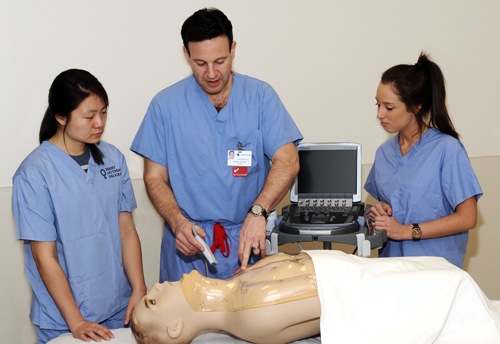Graham Cancer Center pioneers clinical immersion program for engineering students


In a first-of-its-kind program in the nation, cancer specialists at the Helen F. Graham Cancer Center are closing the gap between the real world and the classroom for tomorrow’s biomedical engineers.
“Our goal was to introduce future biomedical engineers to the problems that need solutions in today’s operating room,” said surgical oncologist Joseph Bennett, M.D., who led a four-week clinical immersion session in January for University of Delaware (UD) students. “In just one month, the students came up with some very good ideas,” he said.
Eleven students took the course, offered in partnership with clinicians and professionals at Christiana Care, Nemours/Alfred I. duPont Hospital for Children and the Infant Behavior Laboratory at UD’s Early Learning Center. The course challenged students to come up with potential solutions for unmet clinical needs.
“This unique clinical immersion session is a model for similar cooperative learning experiences,” said Nicholas J. Petrelli, M.D., Bank of America endowed medical director of the Helen F. Graham Cancer Center. “What better way to allow biomedical engineering students to think outside the box than to place them in a health care environment to benefit patient treatment?”
The Graham Cancer Center hosted UD juniors Madison DeFrank and Anna Sung, who shadowed 10 different specialists and gained exposure to surgical oncology techniques, medical devices and instrumentation in the operating room. Their mission was to observe, identify and develop potential solutions to some of cancer surgery’s most intricate and pressing technical challenges.
The students presented their ideas to participating faculty and industry sponsors at the Nemours/A.I. duPont Hospital for Children in January during a poster session funded by the Delaware Health Science Alliance. Proposed innovations included a biodegradable suture delivery system, a waterproof sealant to close incisions, a “belly cam” to view the inner abdomen, an automated “twitch” monitor for patients under anesthesia and a pill-sized camera for taking pictures inside the digestive track. Several students are eager to transform their ideas into formal senior design projects next year.
Jill Higginson, Ph.D., associate director of UD’s Biomedical Engineering Program, conceived the idea for the course and secured the student placements together with David Martin, Ph.D., Karl Bõer chair of UD’s Department of Materials Science and Engineering.